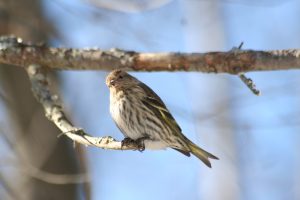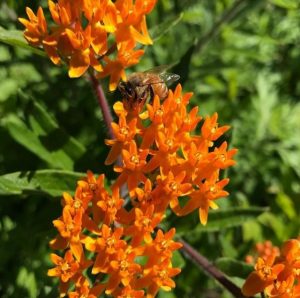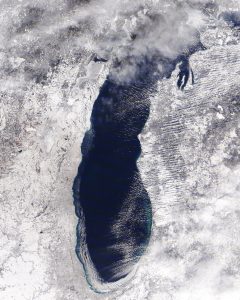By Sarah Irvin, Naturalist at DeGraaf Nature Center

Climate is defined as the weather in a particular area over a large time period, which unveils patterns when recorded, allowing us to create models that mimic and make predictions.
Unfortunately, climate trends will become increasingly more challenging to predict as temperatures and precipitation events shift; the phenomenon that we have named “global warming” might more accurately be called “global weirding.”
While it is true that the planet is warming on average, it is the ever-increasing rate of change and values outside of acceptable climate variability that are concerning.

The U.S. Global Climate Change Research Program conducted an evaluation and concluded the following about what types of changes to expect in the Midwest over the next century:
Plants: In the early growing season, agricultural yields will be reduced by rising temperatures, excessive soil moisture, and erosion from increased rain. In the late growing season, invasive species and pests currently stressing our plants will worsen from an increased frequency of drought. Water stress on all plants will eventually lead to a lowered species diversity and productivity in our forests.

Water: Our Great Lakes are not receiving the annual ice cover that we are used to seeing, allowing evaporation to occur year-round (with summer evaporation rates increasing).
Changes in water level and temperature can stress native species, creating opportunities for invasive species and toxic algal blooms.
An Environmental Protection Agency study projects that decline in water quality, along with increased storm impacts, will negatively affect Michigan coastal communities.
Animals: Migrating birds will fight stronger headwinds on a longer journey south, but return with the push of the wind, allowing them to conserve energy and arrive at their breeding grounds healthier. Biologists’ already are seeing birds adapting their flight paths and have hope that the gradual nature of the change will allow them to continue to adjust.
But they also note that imbalanced adaptations in lifecycles or bloom times could decrease food availability across all animals.
At the same time, ecosystem services such as flood control, water purification, and crop pollination provided by plants and animals will decrease as species diversity declines and habitats degrade.
People: With warming temperatures, pollen seasons will likely extend, impacting people with seasonal allergies. And within our human infrastructure, we can expect property damage and disrupted transportation from increased heavy rain events, subsequent flooding, and erosion, according to the assessment. Most people will notice these changes slowly, but those already vulnerable will only become more so.
With the vast interconnected nature of our environment, no change can happen in isolation. Change is a natural, unavoidable part of our planet. We just have to do what we can to limit our impact, and thwart the speed and scale of changes occurring now.
Sarah Irvin holds degrees in geology and terrestrial ecology and is a naturalist at DeGraaf Nature Center. The views expressed here are hers alone and not representative of DeGraaf Nature Center.
![]() This Week’s Sustainability Framework Theme
This Week’s Sustainability Framework Theme
Environmental Awareness/Action: Environmental education and integrating environmental practices into our planning will change negative outcomes of the past and improve our future.
 ABOUT THIS SERIES
ABOUT THIS SERIES
Living Sustainably is a collection of community voices sharing updates about local sustainability initiatives. It is presented by the Holland-Hope College Sustainability Institute, a joint project of Hope College, the City of Holland and Holland Board of Public Works. Go to www.hope.edu/sustainability-institute for more information.

